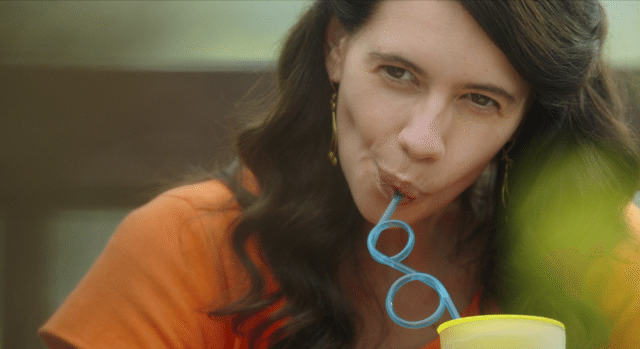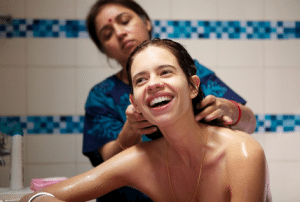
 In Margarita with a Straw, Kalki Koechlin delivers one of her most complex performances yet, as Laila, a teenage girl with cerebral palsy who leaves her native India to pursue a career in New York City. But the film is nothing like what that description might suggest, in fact in terms of films featuring characters with disabilities, this one could teach Hollywood a lesson or two in how it’s done. A big part of its success is owed to Ms. Koechlin’s commanding performance as the very much alive Laila. She makes her a human being who isn’t defined exclusively by her disability, she isn’t bound by rules about how characters like her have been perceived in the media to be saintly, asexual or straight. Ms. Koechlin’s performance is admirable, not only for its committed physical work, but because she gives Laila a true soul. I had the opportunity to talk to her about creating Laila, working in the theatre, and why Hollywood isn’t on her mind just yet.
In Margarita with a Straw, Kalki Koechlin delivers one of her most complex performances yet, as Laila, a teenage girl with cerebral palsy who leaves her native India to pursue a career in New York City. But the film is nothing like what that description might suggest, in fact in terms of films featuring characters with disabilities, this one could teach Hollywood a lesson or two in how it’s done. A big part of its success is owed to Ms. Koechlin’s commanding performance as the very much alive Laila. She makes her a human being who isn’t defined exclusively by her disability, she isn’t bound by rules about how characters like her have been perceived in the media to be saintly, asexual or straight. Ms. Koechlin’s performance is admirable, not only for its committed physical work, but because she gives Laila a true soul. I had the opportunity to talk to her about creating Laila, working in the theatre, and why Hollywood isn’t on her mind just yet.
Laila was inspired by a real life person, Malini Chib, how did you balance paying tribute to the real life person and also to the fictional character?
It is inspired by Malini but it’s in no means an actual account of her life. I think what we found was a lot of Malini’s personality went into Laila, she has a spirit of vivaciousness, she has a great sense of humor, she loves to drink - so the title of the film was definitely inspired by her - she’s also someone who laughs a lot, with her head back and her hands in the air. There was a lot of her spirit in Laila. Malini is more acutely disabled than Laila, her speech is harder to understand, and her mobility is more limited.
While the film is romantic, it doesn’t romanticize Laila’s condition. Was this a challenge?
For me that was the most inspiring thing about the film. It doesn’t make the disabled person someone special, who’s achieved so much, or who is really pure and wonderful. She’s a human being with all her flaws, she’s a typical teenager. She’s insecure, she’s horny, she wants to discover things and make mistakes. I love all of that about the script. The challenge were the six months of training and wondering whether I’d be able to pull it off. Once I was on set I enjoyed it.
You don’t shy away from playing very dark characters. You once said that this was a coincidence, but as you see the world’s injustice has it become more of a mission so to speak?
I don’t know if it’s a mission. I just choose things which make me curious and open my mind to thoughts I haven’t had before. I’m attracted to things we don’t talk about in society, those things motivate me. But I do a theatre show where I’m a goofy clown, I’ve done Yeh Jawaani Hai Deewani where I played a tomboy. I don’t think I’m only trying to make issue-based cinema. I need to believe I can portray a character well, and that the character is valuable to the story.
Would you say that each of your characters affects the way in which you see the world afterwards?
I’m usually relieved when I finish shooting, it feels like finishing a marathon because many of the characters can be intense. But what I do have is an awareness that comes afterwards, I feel more sensitive to people around me, to how they behave. That’s an actor’s job, to find nuisances and things people do when they don’t talk. Their body language and looks can betray them, so I’ve become more sensitive to things like this. In India for instance there is a lack of infrastructure for people with disabilities.
You mentioned in an interview that you loved Bridget Jones’s Diary, but you’re also quite critical of how romantic comedies lie to people about what is expected of women. What would your ideal rom-com be like? Can you write one for us?
(Laughs) Wow, that’s a big demand. I don’t know if I’m ready to write one right now, but I definitely think my ideal romantic comedy would have to do with a man who’s afraid of sex, and a woman who’s like a nympho or who is extremely obsessed with sex.
 You wrote That Girl in Yellow Boots. How did writing your character affect your performance? Did you find yourself being harsher to your character? More critical?
You wrote That Girl in Yellow Boots. How did writing your character affect your performance? Did you find yourself being harsher to your character? More critical?
I definitely had half my research done as an actor because I wrote the film. I was able to know her backstory, normally you have to ask the writer about the characters’ past, but this time I had to ask myself. I don’t know if I wrote it for myself though, definitely a lot of it was based on my own life, like being a white girl in India and what that comes with. There are many little things I remember, like the visa application, the bureaucracy, I even gave her the name of someone I knew. Ruth was a lot like me, but she was a bit more grumpy than I am.
You’ve commented on how your “Indianness” is perceived because you have fair skin, which is fascinating because it’s also the opposite of what Hollywood does with people of color. Are stereotypes inescapable in both industries? Does this keep you from wanting to do Hollywood movies?
If tomorrow Steven Spielberg asked me to do a film I’m not going to say no, but I’m not gonna leave everything that I do here to pursue a Hollywood career. I have a lot of stuff that inspires me where I am.
You’re an accomplished stage actress. Are there parts of the Western canon that you’re interested in playing, or perhaps Indian theatre you’d like to introduce in America?
I have a play called What’s Done is Done it’s an adaptation of Macbeth done by clowns. We’re doing a tour of the US in July, I’m not sure if we’re going to NYC, but it’s a three week tour.
Printing Machine was extraordinary. What’s next after that?
I’m gonna have another piece about the truth of womanhood. They come on their own, I don’t plan them, I write about things that make me upset. I’m sure there are many things that will make me upset and I will write about them.
Who are some of your favorite actresses?
Juliette Binoche inspires me, Meryl Streep, Jodie Foster, Daniel Day-Lewis is not a woman yet, but he might play one soon. In Indian cinema Tabu constantly inspires me, and one of my contemporary actresses called Kangana Ranaut.
Other than the work of Shonali Bose, what other female directors should we keep our eye on?
I just worked with one of them, Anu Menon, she made a film called Waiting which is about two people waiting in hospitals while their loved ones are in a coma. It’s about how you keep living even when you’re waiting.
Margarita with a Straw will be available on VOD on June 14 and on DVD on June 28.